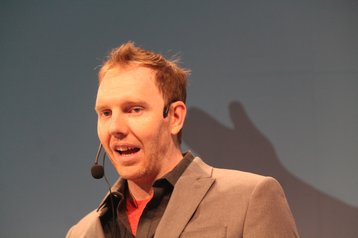The data center industry must base itself on open standards, but can’t afford to make it a religious issue, according to debates at the Datacenter Dynamics event in the CeBIT fair in Hannover, Germany.
“Through open standards I believe we can change the world,” said Cole Crawford of Vapor IO, in the opening session of the last day of DCD at CeBIT, an event-within-an-event at the giant German tech trade show.
Vapor IO’s “hyper-collapsed” data center concept is based on cylindrical “vapor chambers” which use a chimney effect to draw heat through IT equipment more efficiently. The architecture allows 5.4MW of IT equipment to be placed in a space which would accommodate only 4.3MW of traditional rack-and-row equipment. And the Vapor equipment can be added incrementally, one chamber at a time.
Community standards
However, Crawford’s talk was as much about Vapor’s proposals for CORE, a data center runtime environment, which will eventually be open-sourced, potentially creating an open environment for managing and controlling data centers.
Open technologies came to the fore in the closing debate of the event - which dealt with the different options for building open technologies.
While industry consortia can create standards, the industry is seeing a surge in community standards created by users at a speed far greater than can be achieved by vendor bodies or official committees.
These include the Open Compute open source hardware group, which Crawford led till the end of 2014, and the OpenStack open source cloud platform which emerged from NASA and Rackspace.
OpenStack represented by Feederico Facca of Create-Net, uses the Apache 2 license, which received some criticism for adding the freedom to “be selfish” and withold code form the open source pool. Crawford - previously an early OpenStack leader - warned that this freedom opened the potential for proprietary technologies within OpenStack clouds - and had also allowed the fragmentation of the world of containerized software, with the emergence of CoreOs to rival Docker.
Politically, the panel found open source technologies either represented socialism or capitalism, according to the preference of the speakers. All agreed the move is a good one.

